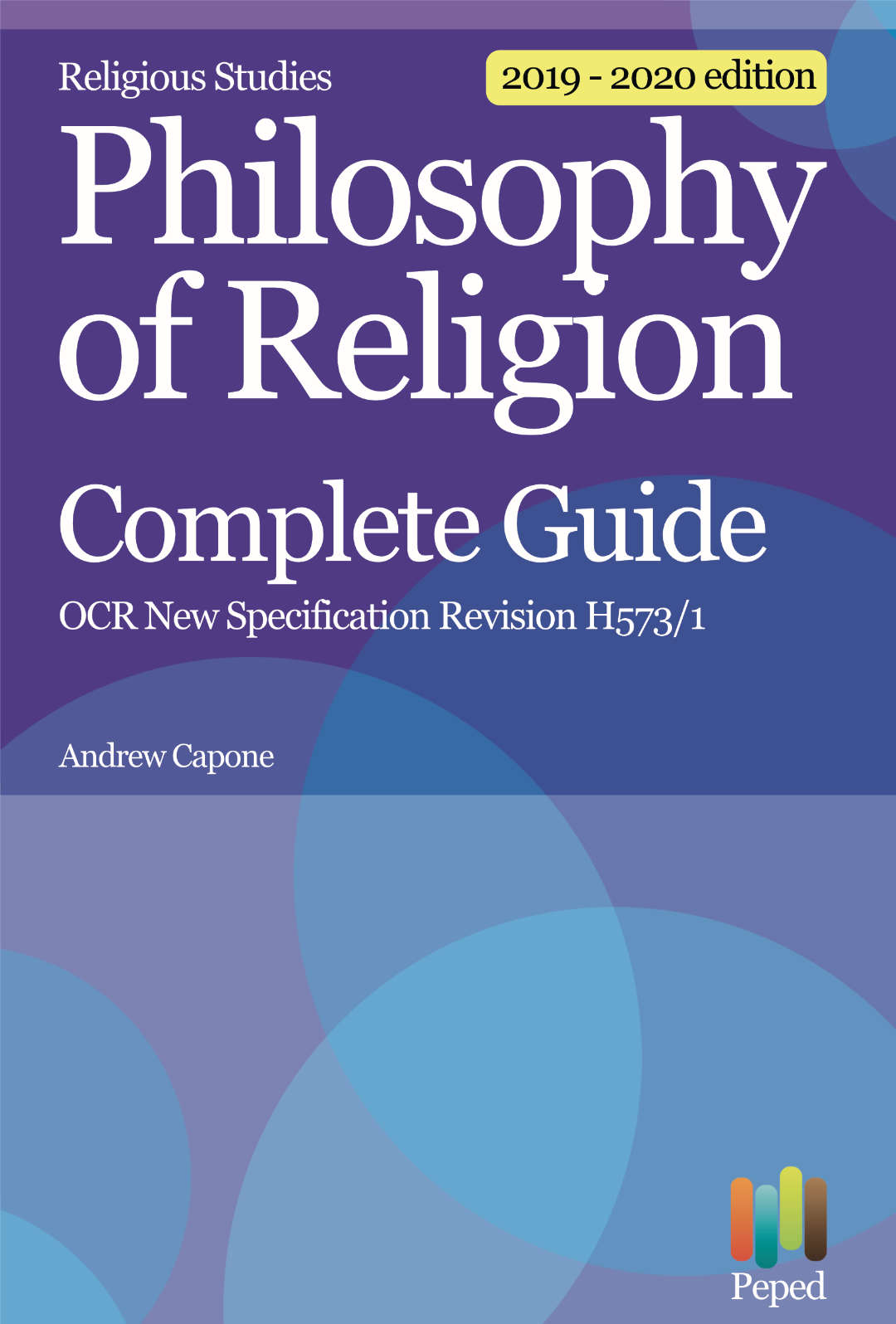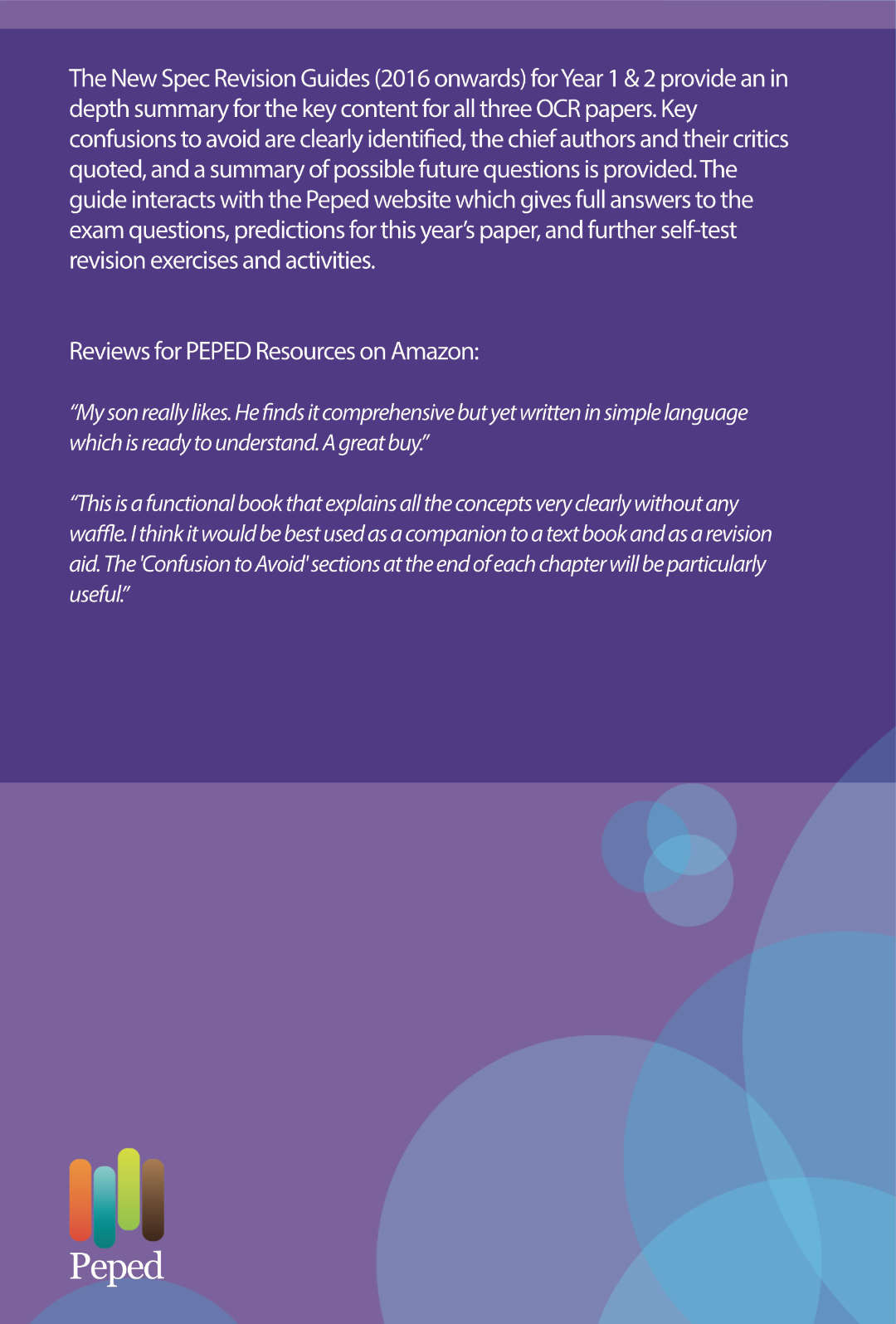Get all 3 complete guide titles for £18.99! Email sales@peped.org & request it.
Religious Studies Philosophy of Religion OCR Revision Complete Guide – New Edition 2020
The New Spec Revision Guides (2016 onwards) for Year 1 & 2 provide an in depth summary for the key content for all three OCR papers. Key confusions to avoid are clearly identified, the chief authors and their critics quoted, and a summary of possible future questions is provided. The guide interacts with the Peped website which gives full answers to the exam questions, predictions for this year’s paper, and further self-test revision exercises and activities.
£9.99
Product details
Format: Softcover Book
Size: 5.5″ x 8.5″ (14 x 0.8 x 21.6 cm)
Paper: Black & White on White paper
Pages: 133
ISBN-13: 9781977044761
For bulk orders over 30 items please contact sales@peped.org directly
Table of Contents 1
1. Philosophical Language and Thought
- 1.1 Ancient Philosophical Influences
Key Terms
Specification - 1.1.1 The Philosophical Influences of Plato
A. Understanding of Reality
B. Theory of FORMs
C. The Allegory of the Cave
D. Evaluation - 1.1.2 The Philosophical Influences of Aristotle
A. Understanding of Reality
B. Four Causes
C. Prime Mover
D. Evaluation
Confusions to Avoid
Key Quotes
Suggested Reading
Practise Exam Question
Possible Future Questions - 1.2 Soul, Mind and Body
Key terms
Specification - 1.2.1 The Thinking of Plato and Aristotle
A. Platonic Dualism
B. Aristotelian Monism
C. Evaluation - 1.2.2 Metaphysics of Consciousness
A. Substance Dualism
B. Materialism
C. Evaluation
Confusions to Avoid
Key Quotes
Suggested Reading
Practise Exam Question
Possible Future Questions
Table of Contents 2
2. Arguments for the Existence of God
- 2.1 Arguments based on Experience
Key Terms
Specification - 2.1.1 The Teleological Argument
A. Aquinas’ Fifth Way
B. Paley’s Teleological Argument
C. Evaluation - 2.1.2 The Cosmological Argument
A. Aquinas’ First, Second and Third Way
B. Evaluation - 2.1.3 Challenges to the Arguments from Observation
A. Hume’s Challenge against the Teleological Argument
B. Hume’s Challenge against the Cosmological Argument
C. The Challenge of Evolution
D. Evaluation
Confusions to Avoid
Key Quotes
Suggested Reading
Practise Exam Question
Possible Future Questions - 2.2 Arguments Based in Reason
Key Terms
Specification - 2.2.1 The Ontological Argument
A. Anselm’s First & Second Version
B. Gaunilo’s Response
C. Evaluation
Confusion to Avoid
Key Quotes
Suggested Reading
Practise Exam Question
Possible Future Questions
Table of Contents 3
3. God and the World
- 3.1 Religious Experience
Key Terms
Specification - 3.1.1 The nature and influence of Religious experience
A. Examples of Mystical Religious Experiences
B. Conversion experiences
C. Conclusions of William James
D. Evaluation - 3.1.2 Different ways in which Religious experience can be understood
A. Union with a great power
B. Psychological affect
C. Product of physiological effect
D. Evaluation
Confusion to Avoid
Key Quotes
Suggested Reading
Practise Exam Question
Possible Future Questions - 3.2 The Problem of Evil
Key Terms
Specification - 3.2.1 The Problem of Evil and Suffering
A. Logical Aspects of the Problem
B. Evidential Aspects of the Problem - 3.2.2 The Theodicies
A. Augustine’s Theodicy
B. Hick’s Theodicy
C. Evaluation
Confusion to Avoid
Key Quotes
Suggested Reading
Practise Exam Question
Possible Future Questions
Table of Contents 4
4. Nature of God
- Key Terms
Specification - 4.1 Omnipotence
A. Evidence
B. Interpretations - 4.2 Benevolence
A. Hell
B. Judgement - 4.3 Omniscience
A. Unlimited Knowledge
B. Limited Knowledge - 4.4 Eternity
A. Timeless
B. Four Dimentionalist Approach
C. Everlasting - 4.5 Free Will
A. Boethius’ Dilemma
B. Alternative Responses
Confusions to Avoid
Key Quotes
Suggested Reading
Practise Exam Question
Possible Future Questions
Table of Contents 5
5. Classical Religious Language
- Key Terms
Specification - 5.1 The Apophatic Way
A. Speaking with Certainty
B. Moses Maimonides
C. Teresa of Avila
D. Evaluation
Strengths of the Apophatic Way - 5.2 The Cataphatic Way
A. The need for Analogy
B. Analogy of Attribution
C. Analogy of Proportionality
D. Evaluation - 5.3 Symbolism
A. What are Signs and Symbols?
B. Paul Tillich on Signs and Symbols
C. The use of Symbols in Scripture and Religious Language
D. Evaluation
Confusions to Avoid
Key Quotes
Suggested Reading
Practise Exam Question
Possible Future Questions
Table of Contents 6
6. Twentieth Century Perspectives on Religious Language
- Key Terms
Specification - 6.1 Logical Positivism
A. The Principle of Verification
B. Ayer’s Variations of the Principle of Verification - 6.2 Wittgenstein’s Language Games
A. Language as a Form of Life
B. Meaningful not Cognitive - 6.3 Falsification Symposium
A. Falsification
B. Bliks
C. Falsification Parables
Confusions to Avoid
Key Quotes
Suggested Reading
Practise Exam Question
Possible Future Questions







